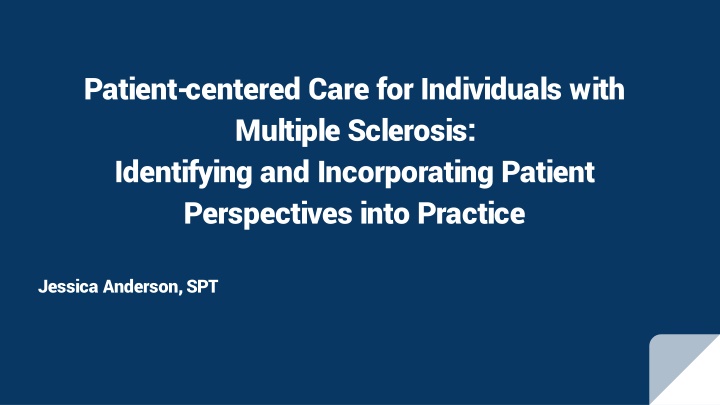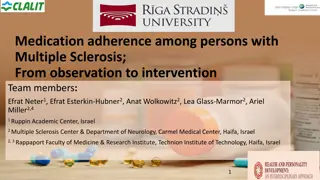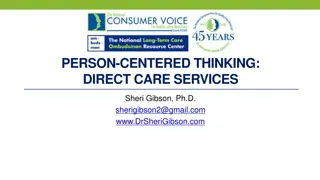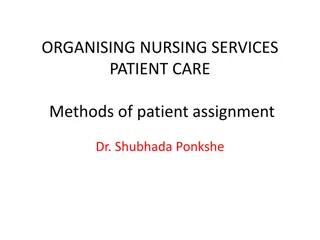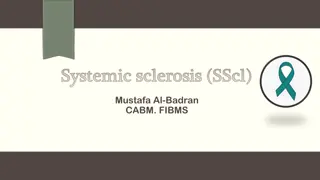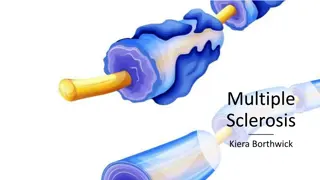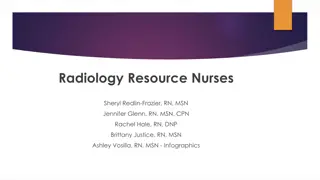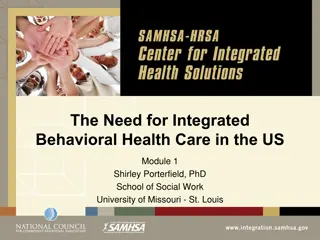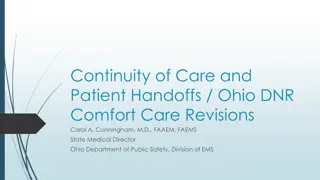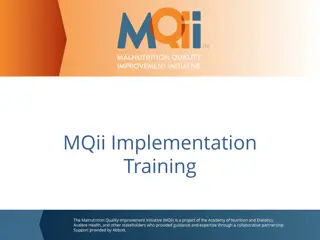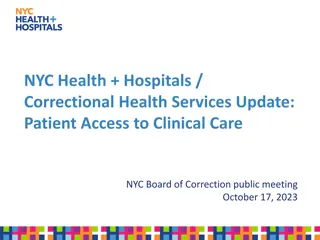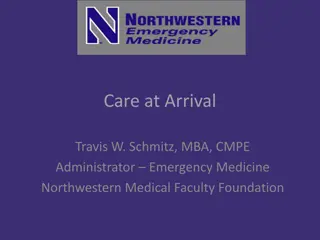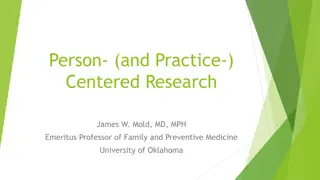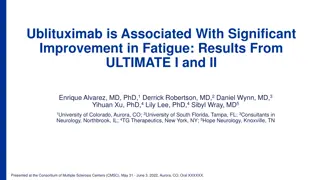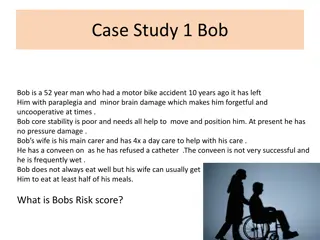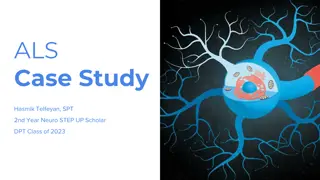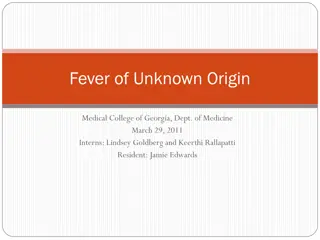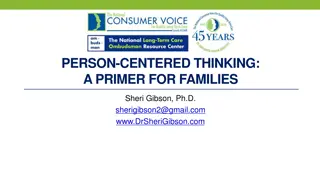Patient-Centered Care for Individuals with Multiple Sclerosis: Incorporating Patient Perspectives
This research project focuses on incorporating patient perspectives into practice, emphasizing patient-centered care and evidence-based practice for individuals with Multiple Sclerosis (MS). Key themes, treatment options, and research objectives are explored through data collection methods like focus groups and surveys.
Download Presentation

Please find below an Image/Link to download the presentation.
The content on the website is provided AS IS for your information and personal use only. It may not be sold, licensed, or shared on other websites without obtaining consent from the author.If you encounter any issues during the download, it is possible that the publisher has removed the file from their server.
You are allowed to download the files provided on this website for personal or commercial use, subject to the condition that they are used lawfully. All files are the property of their respective owners.
The content on the website is provided AS IS for your information and personal use only. It may not be sold, licensed, or shared on other websites without obtaining consent from the author.
E N D
Presentation Transcript
Patient-centered Care for Individuals with Multiple Sclerosis: Identifying and Incorporating Patient Perspectives into Practice Jessica Anderson, SPT
Learning Objectives Define patient-centered care and evidence-based practice Understand the purpose and objectives of this research project Summarize key themes from the data Incorporate key takeaways into personal approach to goal-setting and treatment for individuals with multiple sclerosis (MS)
What is patient-centered care1? Incorporate patient s preferences, needs and values Empowerment of patients Shared decision making Treating the Disease Treating the Patient
What is evidence-based practice2? Clinical Expertise Best Research Evidence Patient Values and Preferences
What is effective physical therapy? What is a clinically meaningful outcome in physical therapy ? No accepted definition for walking treatments3,4 Objective Outcome Measures Subjective Outcome Measures
Treatment options for walking difficulties in multiple sclerosis (MS): patient and provider perspectives
Research Objectives Engage persons with MS and healthcare providers on their perspective on what constitutes effective walking treatment Determine what factors into treatment selection Identify what is considered a meaningful treatment outcome
Data Collection Focus Group 4 individuals with MS Moderated, recorded, and transcribed Interview 1 individual with MS Recorded and transcribed Survey Ongoing
Opening Questions Today we are going to be talking about the sorts of difficulties you can experience due to MS, especially related to walking, and some of the treatments that can help improve your walking, such as physical therapy. When I say the words, physical therapy, what is the first thing that comes to mind? Now I want you tell us about some of the experiences you have had with physical therapy or physical therapists.
Transition Questions Tell us about some of the difficulties you experience as a result of your MS that limit your walking or your ability to move around and do the things you want to do? Think back to the last time you went to physical therapy: What was your goal? What did you want to achieve from physical therapy? What do you think was the most effective part of your physical therapy? What do you think was the least effective part of your physical therapy?
Key Questions How do you know if a treatment has been effective? What is the most important thing to you that has to improve or change for you to feel like you have benefited from a particular treatment or therapy? What is most important to you when choosing a treatment option how much it helps you, how much it costs, or how easy it is to do (e.g., taking a pill versus participating in PT)?
Experience with Physical Therapy Beneficial First impressions [of physical therapy] is gift from god Frustrating I just feel like a lot of exercises that I've gotten just end up being kind of frustrating and nearly useless because I cannot do them as effectively as I'd like to But I just feel like I still haven't gotten the exercises that would really make a big difference.
Experience with Physical Therapy Lack of Shared Decision-Making 'Cause they didn't listen to me you know, like, it's okay to be a physical therapist, but you also need to listen But, to me, they didn't listen to me, so I didn't feel they were working on the things that I needed. You know like, we share notes, you know, you're my therapist, I'm your patient, and we're going to share with each other what's going on. And you're going to give me suggestions, and I'm going to give you suggestions, and you have to take my suggestion, you know, it's very important to me.
Experience with Physical Therapy Lack of patient education Although sometimes I can't, I have a hard time um, putting together a specific exercise and how it's going to help me walk I don't quite get the muscle group and what it does when I walk that we're working on. When you feel like it makes you more tired and more frustrated to try to do things that are almost impossible to do, then it makes you kind of give up on those particular exercises.
Experience with Physical Therapy Guilt over non-compliance I never do my um, routine at home that I do in physical therapy. Home exercises programs are, they're-it's difficult to carve out [time]. Probably don't do as much as I've been instructed to do.
Experience with Physical Therapy Creative Solutions The most useful PT things that I've done are things where the therapist had been aware of adapting the physical therapy to like my surroundings and making it easy and simple things I could do. That I didn t have to spend half my day trying to get the equipment in the right place I was much more compliant. [My therapist] made it where I could do the exercises like all day, throughout the day and she taught me tricks for like, how to remember to do them several times a day and, that was really, totally great.
Determining treatment effectiveness: PT Maintenance Not getting worse. I don't have any great expectations at this point but I would like to be able to keep at least doing what I can do.
Determining treatment effectiveness: PT Quality of Life Improvements Can I do a little bit more than I used to do?... am I sleeping better?...am I in less pain? Well, I think a lot of it is just whether I feel like I can get around more easily and if I don't get tired out as much. ... Well, am I better than I was? ...the same as I was a year ago. Then that's where I have to look through notes...I've learned to keep notes.
Determining treatment effectiveness: PT Functional Improvement I've had a lot of physical therapy and people that have worked with me and pushed me really hard, and it did help, and as long as I kept doing it, which I did, 'cause I started doing stairs, you know, not a lot, but you know, maybe five-five steps by myself and to me that's uh, improvement. I think I would need to feel like my thigh muscle was more functional. That I was able to lift my leg up better. That I wouldn't have the spasticity that I have often in that leg. And that I could raise my toes better than I can right now. So, those would be probably the main things I'd like to have happen.
Determining treatment effectiveness: Medication Self-testing I have gone off it for about 48 hours to see if it makes any difference and I do think it does help some. It's not a really dramatic difference but I did notice a difference when I stopped it for a couple of days Without the Ampyra, it really kind of dragged even more. Stop taking it if you re taking something for fatigue and you re not sure it s working, knock it off for a couple days, you ll find out if it s working.
The right therapist Therapist characteristics [What] I really like about [that clinic] is all the therapists, not only do they work together, they remember you. And I think there's a certain personality you need to be a physical therapist or an effective physical therapist. And I think they all exhibit that down there. Don t tell me , here, go on the Nu Step for you know, 10 minutes and I ll be back. I don t want to hear that you know? You [the physical therapist] need to be there and find out how I m ticking. They [the physical therapists] didn't listen to me, so I didn't feel they were working on the things that I needed.
The right therapist Experience treating individuals with MS I think the other thing to is, so many of them are trained with MS, they know not to get you to, to overdo it. They understand MS patients. they [current physical therapy clinic] don't seem to have a lot of physical therapists who are specifically trained in MS and MS related therapies and so I would like to feel like somebody that was my physical therapist had a really good understanding of the difficulties a little more understanding maybe of what the limitations are of MS.
Factors influencing treatment choice Healthcare Provider I think I was the one who had to bring up the physical therapy, put in a request for it. I'm the one that has to advocate for myself. And as far as physical therapy goes, it's often what, like finding the right therapist who understands me. And will work with my needs.
Factors influencing treatment choice Insurance I guess the way the insurance works, it's like, you have so few PT treatments a year and having kind of constant PT throughout the year really makes a difference. I guess cost is certainly something because my insurance will pay for a certain number of sessions
Factors influencing treatment choice Accessibility Probably partly how hard or easy it is to get to the actual therapy session. A lot of it is the ease of accessibility for me.
Key Takeaways Practice active listening Mutually define improvement with patients Practice shared-decision making Delve deeper in your goal-setting Use patient reported outcome measures Educate patient on treatment choices
Suggested Patient Reported Outcome Measures7 Highly Recommended: Recommended: 12-Item MS Walking Scale Activities-Specific Balance MS Impact Scale (MSIS-29) Confidence Scale MS Quality of Life (MS QoL-54) Modified Fatigue Impact Scale MS Quality of Life Inventory
Gaps in Knowledge Define improvement and clinically meaningful Evidence-based ways to engage patients with MS in shared decision-making Effectiveness of patient-report outcome measures
Sources 1. Golan D, Staun-Ram E, Miller A. Shifting paradigms in multiple sclerosis: from disease-specific, through population- specific toward patient-specific. Curr. Opin. Neurol. 2016;29(3):354-361. doi:10.1097/WCO.0000000000000324. 2. Overview -Introduction to Evidence-Based Practice -LibGuides at Duke University Medical Center. Available at: http://guides.mclibrary.duke.edu/c.php?g=158201&p=1036021. Accessed April 15, 2018. 3. Goodman AD, Brown TR, Krupp LB, et al. Sustained-release oral fampridinein multiple sclerosis: a randomised, double-blind, controlled trial. Lancet 2009;373:732-738. 4. Goodman AD, Brown TR, Edwards KR, et al. A phase 3 trial of extended release oral dalfampridinein multiple sclerosis. Ann Neurol2010;68:494-502. 5. Plummer P. Focus group methodology. Part 1: Design considerations. Int. J. Ther. Rehabil. 2017;24(7):297-301. 6. Plummer P. Focus group methodology. Part 2: Considerations for analysis. IntJ Ther Rehabil2017;24(8):345-351. 7. MS-EDGE Outcome Measures for In-and Out-Patient Rehabilitation. MS EDGE Task Force website http://www.neuropt.org/docs/ms-edge-documents/ms-edge_rehab_recs5417E23D4B53.pdf?sfvrsn=2. Accessed April 15, 2018.
